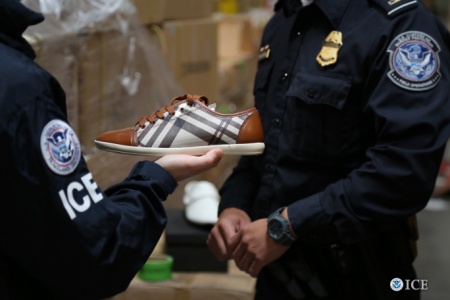ICE remains committed to IP enforcement
WASHINGTON – U.S. Immigration and Customs Enforcement (ICE) is reminding the U.S. public on World Intellectual Property Day 2016 that IP theft threatens the health and safety of consumers, negatively impacts the American economy and funds transnational criminal organizations involved in violent activities.
The ICE-led National Intellectual Property Rights Coordination Center (IPR Center), a task-force agency combining the expertise of 23 investigative organizations, is the U.S. government’s response to ensuring national security by protecting the public, the economy and the national defense supply chain that are vulnerable to the proliferation of counterfeit goods.
The IPR Center supports ICE agents conducting investigations to identify, disrupt and dismantle entities involved in the manufacture and distribution of illicit counterfeit products. The agency’s robust operational portfolio played an essential role in contributing to the record number of seizures made in fiscal year 2015 that were worth an estimated $1.35 billion. There were 538 arrests, with 339 indictments, and 357 convictions all related to intellectual property rights violations during the same year.
The IPR Center has enhanced IP enforcement by collaborating with international customs and investigative authorities. Last fall the agency coordinated with police in China to shut down a counterfeit airbag distribution network that was selling illegal goods in the United States. In February, the IPR Center worked with enforcement agencies in Mexico and Hong Kong to crackdown on the sale of counterfeit sports-related merchandise.
Other initiatives over the past year include expanding the Trade Enforcement Coordination Center effort, an approach that strengthens ICE and U.S. Customs and Border Protection collaboration in major U.S. port cities by increasing the exchange of intelligence, and developing new operations to place emphasis on various counterfeit consumer products harmful to the public.
Founded in 2000, the IPR Center – formally codified in the Trade Facilitation and Trade Enforcement Act of 2015 – is one of the U.S. government's key weapons in the fight against criminal counterfeiting and piracy. The center uses the expertise of its 23 member agencies to share information, develop initiatives, coordinate enforcement actions, and conduct investigations related to IP theft. Through this strategic interagency partnership, the IPR Center protects the public's health and safety, the U.S. economy and the war fighters.
In 2000, the World Intellectual Property Organization (WIPO) designated April 26 – the day on which the WIPO Convention came into force in 1970 – as World IP Day with the aim of increasing general understanding of IP. Since then, World IP Day has offered a unique opportunity each year to join with others around the globe to consider how IP contributes to the flourishing of music and the arts and to driving the technological innovation that helps shape our world.


